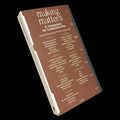Cross-media publishing with MediaWiki
Cross-media publishing with MediaWiki
Hackers & Designers’ publishing experiments intersect computer programming, art, and design, and involve the building of self-made, hacked, and reappropriated tools and technical infrastructures. In 2021-2023 H&D developed several cross-media publications using a web-to-print workflow further referred to as Wiki2Pdf or Wiki2Pdf2Web. Developing these publishing workflows is part of an ongoing collective exploration into unusual, non-proprietary, open-source, free and libre publishing tools and workflows.
Such tools come with their own quirks and ask us to re-think our relationship to design tools. H&D's aim is that these publications (including the documentation of the process of their coming into being) contribute to a growing community of critical designers and developers who consider it relevant to rethink their tool-ecologies. Furthermore developing the hybrid publishing activities with every publication is also an investment into building more durable sustainable forms of collaboration on such projects. In doing so we are building on the knowledge and practices of many designers and collectives that work with and contribute to open-source approaches to designing on and offline publications. (see: Tooling)
The first publication was a book published by Valiz titled "Making Matters. A Vocabulary of Collective Arts". The second publication was self-published by H&D and titled "First, Then...Repeat. Workshop scripts in practice". With every publication the technical infrastructure, editing and design workflow were further developed. The design of both publications accommodated non-linear reading. Cross-references indicate connections across chapters, themes, methods and timelines.
Video: Explanatory presentation of the cross-media publishing workflow with MediaWiki
While the first publishing process put more emphasis on the printable output, the second iteration treated on and offline output equally.
The hybrid publishing process utilizes MediaWiki (installed on H&D's server) as a central publishing and content management infrastructure, where the content (text, images, video) can be gathered and edited. In the case of the 2nd publication the two outputs: 1. printable pdf rendered in the browser ( https://wiki2print.hackersanddesigners.nl/pdf/FiguringThingsOutTogether ), and 2. the front end website ( https://firstthenrepeat.hackersanddesigners.nl/#A_Note_on_the_design_of_this_publication ) pull from the same source ( https://wiki2print.hackersanddesigners.nl/wiki/Publishing:FiguringThingsOutTogether ).
Following open-source principles, the tool ecosystem that evolved around the design of this publication is documented and published on the H&D website and git repository under the CC4r license, providing the possibility of continuation in other contexts, studying, critiquing, and repurposing. Lessons learned
- For the design to develop most organically and to sustain flexibility regarding CSS styling we recommend utilizing as much as possible the CSS panel that MediaWiki provides, and that can be reached by anyone collaborating on the publication.
- Although the intention may be to develop web and printable output in parallel, and the aim is that both outputs support each other and do not stand in competition, the printing deadline tends to shape the process in a way that generating the pdf becomes the first priority. To ensure a most fruitful interchange between the two outputs, it is advisable to carve out sufficient space to co-develop the two trajectories.
- To allow for a collaborative and agile process it is advisable to work with (and not against) the Wiki structure and stick more to what the infrastructure affords. For instance to avoid hard-coded menus and navigations. The more hard-coded elements the more vulnerable the system and workflow becomes and the more reliable collaborators become on the person who has coded the parts or has access to these parts.
The process of developing this hyrbid publishing project unfolded very much in collaboration and constant exchange with the wider community of hackers and designers and community organizers. We openened up the publishing workflow through various workshops at Page Not Found in The Hague and TROEF in Leiden. Organizing events and workshops around the publishing process was an attempt to include various perspectives into the process. Contributors and workshop participants for instance contributed various feminist/intersectional perspectives and reflections on accessbility. We offered contributors a fee and leveraged the making of this publication as an opportunity to reconnect to our diverse community and gave them a platform to share their stories. We encouraged contributors to also reflect on the specific (sometimes precarious) collective conditions in which their work evolves. An example of this is the contribution of Prototype PGH, "Open-source Parenting," authored by Naomi Chambers and Erin Gatz who proposed through their contributions ways to collaborate across differences and build support structures for black mothers so they can participate in the maker community.
Opening up and sharing processes, content and code is H&D's way to inspire various communities to consider non-proprietary free tools, and a way to create more equitable ways of publishing, challenging abritrary boundaries between professional and amateur software use.
The content and code are made available under COLLECTIVE CONDITIONS FOR RE-USE (CC4r).
"The authored work released under the CC4r was never yours to begin with. The CC4r considers authorship to be part of a collective cultural effort and rejects authorship as ownership derived from individual genius. This means to recognize that it is situated in social and historical conditions and that there may be reasons to refrain from release and re-use." https://gitlab.constantvzw.org/unbound/cc4r
All typefaces used in this publication are available at ‘Badass Libre Fonts By Womxn’, a repository of open source and/or libre typefaces composed by Loraine Furter and Velvetyne Libre and Open Source Type Foundry.
Collaborators:
- Anja Groten (editing, design)
- Juliette Lizotte (wiki editing, design)
- Heerko van der Kooij (web2print, Jinja, Pagedjs)
- Maisa Imamović (web development)
- Karl Moubarak (web2web/print)
Other relevant links:















